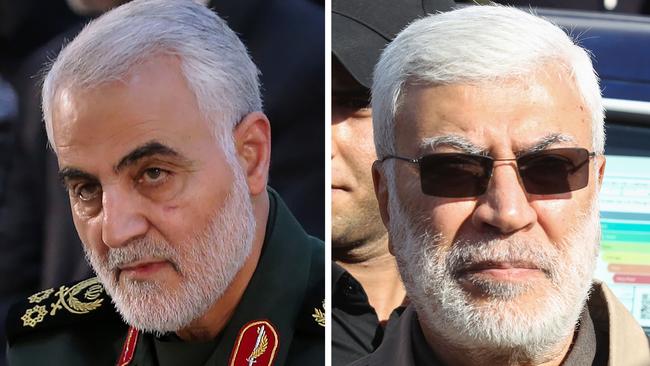Iranian general Qassem Soleimani’s killing raises US-Iran tensions to new highs
One Iranian response might be to launch asymmetric attacks on US personnel and bases across the Middle East.

His network funded and sponsored hyper-accurate rocket and mortar attacks on US bases. They fielded the deadliest roadside bombs of the war — “explosively formed projectiles”, launching a supersonic jet of molten metal that could cut through armoured vehicles like a blowtorch through butter.
Soleimani’s underground cells mentored militia groups, penetrated Iraqi government ministries, and conducted economic and political warfare to increase Iran’s influence at the expense of the US, Israel and regional Sunni states such as Saudi Arabia.
But many Iraqis also saw Soleimani as a saviour. When Islamic State launched its blitzkrieg in 2014, capturing one-third of Iraq in mere weeks, Soleimani led the cadre of Iranian trainers who came to Iraq’s aid, helping establish the Popular Mobilisation Forces that beat Islamic State back from Baghdad and spearheading a series of offensives to recapture Ramadi, Tikrit, Fallujah and finally Mosul.
More than 40 militias make up the PMF, which numbers around 140,000 and operates under the direction of the Iraqi ministry of defence, but is funded, armed and trained by the Quds Force. During the dark days of 2014, Soleimani seemed to be everywhere — with frontline units, encouraging fighters, directing military and humanitarian support, and frequently exposing himself to danger. He was often accompanied by PMF leader Abu Mahdi al-Muhandis, who became a key interlocutor between the Iraqi government and the PMF’s Iranian sponsors.
Muhandis and Soleimani were killed together, along with several PMF members, when two rockets struck a PMF base near the cargo terminal of Baghdad airport. Iraq and Iran have blamed the US and Israel for the strike, while US officials have acknowledged the strike.
The killing of Muhandis and Soleimani came on top of recent Israeli air strikes against long-range rockets that the PMF and Quds Force had positioned inside Iraq (and which may have been used to strike oil facilities in eastern Saudi Arabia last September) as well as two recent US strikes targeting PMF members in retaliation for rocket attacks on a US base.
Those strikes outraged Iraqis, with senior officials calling them a breach of Iraqi sovereignty, and protesters massing in Baghdad and storming the US embassy. Ironically, the strikes also unified Iraqis against the US, suddenly reversing the mood after months of anti-Iranian demonstrations against corruption and the pervasive influence of Tehran.
In a military sense, the ball is now in Tehran’s court. Iran does not seek a large-scale conventional war with America, and despite the US deployment of an airborne quick-reaction force to Kuwait and heated rhetoric from the Pentagon overnight, it seems clear that Washington also wants to avoid such a conflict.
One Iranian response might be to launch asymmetric attacks on US personnel and bases across the Middle East. Another might be a wider series of attacks in Africa, Latin America, Europe or even the continental US. A third might be rocket attacks on Israel, Saudi Arabia, the United Arab Emirates, or other US allies.
Whatever the response may be, anti-American feeling in Iraq today — and US-Iranian tension — is at its highest level in recent memory.




Qassem Soleimani, killed on Friday in Baghdad, was a towering figure. As head of the Quds Force, the covert-action arm of Iran’s Revolutionary Guards, he controlled a network of secret cells, terrorist groups, and political allies that posed a major threat to US-led forces during the Iraq war.